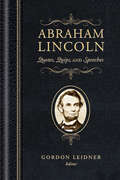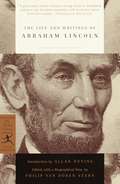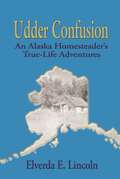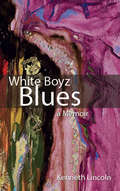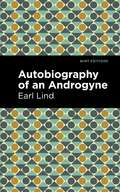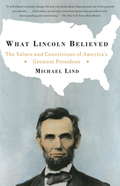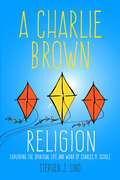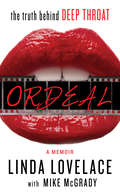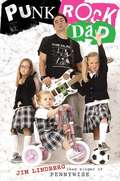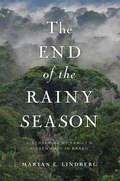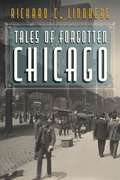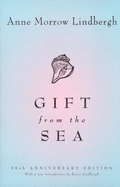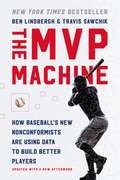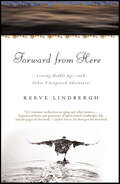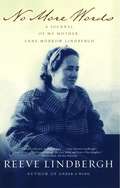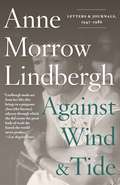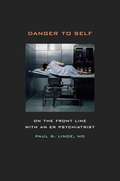- Table View
- List View
Abraham Lincoln Quotes, Quips, and Speeches
by Abraham Lincoln Gordon LeidnerMore than 140 years since his death, the enduring legacy of a great president, an American success story, and the celebrated leader of the Civil War continues. Abraham Lincoln: Quotes, Quips, and Speechescaptures the essence of the sixteenth president. In addition to Lincoln's own words, Gordon Leidner includes insights into the man by those who knew him best, from his wife, Mary Todd Lincoln, to his greatest political opponent, Stephen A. Douglas. Numerous photographs add to the charm and usefulness of the book.
The Life and Writings of Abraham Lincoln (Modern Library Classics)
by Abraham Lincoln Allan Nevins Philip Van SternAbraham Lincoln, the greatest of all American presidents, left us a vast legacy of writings, some of which are among the most famous in our history. Lin-coln was a marvelous writer--from the humblest letter to his great speeches, including his inaugural addresses, the Emancipation Proclamation, and the Gettysburg Address. His sentences were so memorably crafted that many resonate across the years. "Fourscore and seven years ago," begins the Gettysburg Address, "our fathers brought forth on this continent a new nation, conceived in liberty, and dedicated to the proposition that all men are created equal." In 1940, the prolific author and historian Philip Van Doren Stern produced this volume as a guide to Lincoln's life through his writings. Stern's "Life of Abraham Lincoln" is a full biography of the man and includes a detailed chronology. Stern has collected all the essential texts of Lincoln's public life, from his first public address--a stump speech in New Salem, Illinois, in 1832 for an election he went on to lose--to his last piece of public writing, a pass to a congressman who was to visit the president the day after Lincoln went to Ford's Theater on April 14, 1865. Some 275 such documents are collected and placed in their historical context. Together with the "Life" and the Introduction, "Lincoln in His Writings," by noted historian Allan Nevins, they give a full and vivid picture of Abraham Lincoln.The Modern Library has played a significant role in American cultural life for the better part of a century. The series was founded in 1917 by the publishers Boni and Liveright and eight years later acquired by Bennett Cerf and Donald Klopfer. It provided the foundation for their next publishing venture, Random House. The Modern Library has been a staple of the American book trade, providing readers with affordable hardbound editions of important works of literature and thought. For the Modern Library's seventy-fifth anniversary, Random House redesigned the series, restoring as its emblem the running torchbearer created by Lucian Bernhard in 1925 and refurbishing jackets, bindings, and type, as well as inaugurating a new program of selecting titles. The Modern Library continues to provide the world's best books, at the best prices.
Udder Confusion: An Alaska Homesteader's True-Life Adventure (Elverda Lincoln)
by Elverda LincolnUdder Confusion is an Alaska homesteader's true-life adventure. “Alaska!” You mean you're going to farm in Alaska? What are you going to harvest, ice and snow? You must be crazy.” With these statements from friends and family ringing in our ears, we pointed the Studebaker north. North to Alaska! We arrived in Alaska light on assets, young, vigorous, in good health, and optimistic about the future. Homesteading was exciting and full of experiences and each day was a new Alaska adventure. Life was hard, but we met each problem with determination and ambition. We learned that it isn't what happens to you, it's how you react that matters. Our memories are of hard work, dreams, disappointments, plus many pleasant experiences. Many of our homestead friends are still around and unfortunately some have passed on to the big homestead in the sky. We are in the fall of our years, with the energy of spring chickens, and look forward to our next Alaska adventure.
White Boyz Blues
by Kenneth LincolnA memoir of a father's pain, humor, and healing as he learns to embrace a new masculinity "down West."
Autobiography of an Androgyne
by Earl LindAutobiography of an Androgyne (1918) is an autobiography by Earl Lind. Accompanied by an introduction by Dr. Alfred W. Herzog, Lind’s autobiography―intended for a clinical audience―has been recognized as a pioneering work in the history of transgender literature. Throughout his life, Lind was forced to justify and defend his existence from puritanical authorities who refused to even recognize the reality of his identity as an androgyne. In the first of his trilogy of autobiographical works, he not only demands recognition, but exposes the denial of his existence as nothing but hatred and fear. “Androgynes have of course existed in all ages of history and among all races. In Greek and Latin authors there are many references to them, but these references are not always understood except by the few scholars who are themselves androgynes or at least passive sexual inverts. […] [T]hese men-women, because misunderstood, have been held in great abomination both in the middle ages and in modern times, but the prejudice against them was not so extreme in antiquity, and a cultured citizen having this nature did not then lose caste on this account.” Situating his own identity within this history of oppression, Lind makes the case for recognizing the presence of androgynes in all human societies. Ever since he was a child, Lind identified as feminine and was keenly aware of his homosexual desires, gaining a reputation among the local boys and soon turning to girls for friendship and understanding. In a world that saw androgynes as both corrupt and willfully different, Lind sought to increase understanding and to explain through scientific, historical, and personal evidence why his identity was congenital, and therefore natural. With a beautifully designed cover and professionally typeset manuscript, this edition of Earl Lind’s Autobiography of an Androgyne is a classic work of transgender literature reimagined for modern readers.
What Lincoln Believed: The Values and Convictions of America's Greatest President
by Michael LindFew biographers and historians have taken Lincoln's ideas seriously or placed him in the context of major intellectual traditions. InWhat Lincoln Believed, the most comprehensive study ever written of the thought of America's most revered president, Michael Lind provides a resource to the public philosophy that guided Lincoln as a statesman and shaped the United States. Although he is often presented as an idealist dedicated to political abstractions, Lincoln was a pragmatic politician with a lifelong interest in science, technology, and economics. Throughout his career he was a disciple of the Kentucky senator Henry Clay, whose "American System" of government support for industrial capitalism Lincoln promoted when he served in the Illinois statehouse, the U. S. Congress, and the White House. Today Lincoln is remembered for his opposition to slavery and his leadership in guiding the Union to victory in the Civil War. But Lincoln's thinking about these subjects is widely misunderstood. His deep opposition to slavery was rooted in his allegiance to the ideals of the American Revolution. Only late in his life, however, did Lincoln abandon his support for the policy of "colonizing" black Americans abroad, which he derived from Henry Clay and Thomas Jefferson. Lincoln and most of his fellow Republicans opposed the extension of slavery outside of the South because they wanted an all-white West, not a racially integrated society. Although the Great Emancipator was not the Great Integrationist, he was the Great Democrat. In an age in which many argued that only whites were capable of republican government, Lincoln insisted on the universality of human rights and the potential for democracy everywhere. In a century in which liberal and democratic revolutions against monarchy and dictatorship in Europe and Latin America repeatedly had failed, Lincoln believed that liberal democracy as a form of government was on trial in the American Civil War. "Our popular government has often been called an experiment," Lincoln told the U. S. Congress, insisting that the American people had to prove to the world that "when ballots have fairly, and constitutionally, decided, there can be no successful appeal, back to bullets. " If the United States fell apart after the losers in an election took up arms, then people everywhere might conclude that democracy inevitably led to anarchy and "government of the people, by the people, for the people" might well "perish from the earth. " "He loved his country partly because it was his own country, but mostly because it was a free country. " What Lincoln said of Henry Clay could be said of him as well. InWhat Lincoln Believed, Michael Lind shows the enduring relevance of Lincoln's vision of the United States as a model of liberty and democracy for the world.
A Charlie Brown Religion: Exploring the Spiritual Life and Work of Charles M. Schulz (Tom Inge Series on Comics Artists)
by Stephen J. LindCharles M. Schulz's Peanuts comic strip franchise, the most successful of all time, forever changed the industry. For more than half a century, the endearing, witty insights brought to life by Charlie Brown, Snoopy, Linus, and Lucy have caused newspaper readers and television viewers across the globe to laugh, sigh, gasp, and ponder. A Charlie Brown Religion explores one of the most provocative topics Schulz broached in his heartwarming work--religion.Based on new archival research and original interviews with Schulz's family, friends, and colleagues, author Stephen J. Lind offers a new spiritual biography of the life and work of the great comic strip artist. In his lifetime, aficionados and detractors both labeled Schulz as a fundamentalist Christian or as an atheist. Yet his deeply personal views on faith have eluded journalists and biographers for decades. Previously unpublished writings from Schulz will move fans as they begin to see the nuances of the humorist's own complex, intense journey toward understanding God and faith."There are three things that I've learned never to discuss with people," Linus says, "Religion, politics, and the Great Pumpkin." Yet with the support of religious communities, Schulz bravely defied convention and dared to express spiritual thought in the "funny pages," a secular, mainstream entertainment medium. This insightful, thorough study of the 17,897 Peanuts newspaper strips, seventy-five animated titles, and global merchandising empire will delight and intrigue as Schulz considers what it means to believe, what it means to doubt, and what it means to share faith with the world.
Ordeal
by Linda Lovelace Mike McGradyGood Girl. Obedient Wife. Porn Slave. Deep Throat Was Only The Beginning Linda Boreman was just twenty-one when she met Chuck Traynor, the man who would change her life. Less than two years later, the girl who wouldn t let her high school dates get past first base was catapulted to fame she could never have imagined in her wildest dreams--or worst nightmares. Linda Boreman of Yonkers, New York, had become Linda Lovelace, international adult film superstar. The unprecedented success of Deep Throat made porn popular with the mainstream and made Lovelace a household name. But nobody, from the A-list celebrities who touted the movie to the audiences that lined up to see it, knew the truth about what went on behind the scenes. Enslaved by the man who would eventually force her into marriage so that he could control her completely, Linda was beaten savagely with regularity, hypnotized, and raped. She was threatened with disfigurement and death. She was terrorized into prostitution at gun and knifepoint. She was forced to perform unspeakable perversions on film. She made "Deep Throat" under unimaginable duress. Years later, Linda would come out of hiding to relate her side of the story--a modern horror tale of humiliation, betrayal, and violence that would rock the porn industry and put its teller in fear for her life. . . Ordeal Linda Lovelace became a household name in 1972, when "Deep Throat" became the first pornographic movie ever to cross over into the mainstream. Due to the success of "Deep Throat, " she appeared in "Playboy, Bachelor, " and even "Esquire" between 1973 and 1974. Soon after, Lovelace joined in with anti-pornography feminists led by Andrea Dworkin and Catharine MacKinnon, and she testified before Attorney General Meese s Commission on Pornography in 1986. She died in Denver on April 22, 2002, due to severe injuries in a car accident. Journalist and former syndicated columnist Mike McGrady"(Newsday, Los Angeles Times)" has written many books, and he was the chief catalyst for the bestselling novel "Naked Came the Stranger. ""
Punk Rock Dad
by Jim LindbergJim Lindberg is a Punk Rock Dad. When he drives his kids to school in the morning, they listen to the Ramones, the Clash, or the Descendents-and that's it. They can listen to Britney and Justin on their own time. Jim goes to soccer games, dance rehearsals, and piano recitals like all the other dads, but when he feels the need, he also goes to punk shows, runs into the slam pit, and comes home bruised and beaten . . . but somehow feeling strangely better. While the other dads dye their hair brown to cover the gray, Jim occasionally dyes his blue or green. He makes his daughters' lunches, kisses their boo-boos, and tucks them in at night-and then goes into the garage and plays Black Flag and Minor Threat songs at a criminal volume. He pays his taxes, votes in all the presidential and gubernatorial elections, serves on jury duty, and reserves the right to believe that there is a vast Right Wing Conspiracy-and that the head of the P.T.A. is possibly in on it. He is a Punk Rock Dad.
The End of the Rainy Season: Discovering My Family's Hidden Past in Brazil
by Marian LindbergMarian Lindberg grew up being told that Walter Lindberg, the man who raised her father, was a brave explorer who had been murdered in the Amazon. She took her father's claims at face value, basking in her exotic roots, until she started to notice things. The unverified legend became a riddle she couldn't solve.As Lindberg moved from journalism to law, fell in love, and sought a family of her own, her father repeatedly interfered. He had a closed vision of his family, and she-unlike the silent Walter-was breaking out. Yet her father's story of the past haunted Lindberg. Long after her father's death, Lindberg set off for the Amazon, determined to find out the truth about Walter. Aided by generous Brazilians who adopted her search as if it were their own, she discovered as much about herself and her family as about Walter, whose true role in Brazil's history turned out to be unexpected and deeply troubling.Sharply observant, wrought with honesty, and sweeping in its ambitions, The End of the Rainy Season is a powerful examination of identity and human relationships with nature, and between one another.
Tales of Forgotten Chicago
by Richard C. LindbergContains twenty-one fascinating, little-known stories about Chicago and its people. Spanning the Civil War through the 1960s, the volume showcases forgotten crimes, punishments, and consequences: poisoned soup that nearly killed three hundred leading citizens; a woman in showbiz and her street-thug husband whose checkered lives inspired a 1955 James Cagney movie; and the first police woman in Chicago, hired as a result of the senseless killing of a young factory girl in a racially tinged case of the 1880s. Also included are tales of industry and invention, such as America's first automobile race, the haunting of a wealthy Gilded Age manufacturer's mansion, and the identity of the telephone's rightful inventor. Chapters on the history of early city landmarks spotlight the fitht to save Lakefront Park and how "Lucky" Charlie Weeghman's northside baseball park became Wrigley Field. Other chapters explore civic, cultural, and political happenings, and some are just wonderful tales, such as a touching story about the sinking of Chicago's beloved Christmas tree ship. The final story describes the start of the Special Olympics which began in Chicago. RICHARD C. LINDBERG is an award-winning author, journalist, and lecturer who has written nineteen other books about Chicago history, politics, criminal justice, sports, and ethnicity. The 2011 memoir of his Northwest Side boyhood Whiskey Breakfast: My Swedish Family, My American Life, was named nonfiction book of the year by the Chicago Writer's Association.
Gift from the Sea
by Anne Morrow LindberghOver a quarter of a century after its first publication, the great and simple wisdom in this book continues to influence women's lives.From the Hardcover edition.
Gift from the Sea
by Anne Morrow LindberghOver a quarter of a century after its first publication, the great and simple wisdom in this book continues to influence women's lives.From the Hardcover edition.
The MVP Machine: How Baseball's New Nonconformists Are Using Data to Build Better Players
by Ben Lindbergh Travis SawchikMove over, Moneyball -- a cutting-edge look at major league baseball's next revolution: the high-tech quest to build better players. As bestselling authors Ben Lindbergh and Travis Sawchik reveal in The MVP Machine, the Moneyball era is over. Fifteen years after Michael Lewis brought the Oakland Athletics' groundbreaking team-building strategies to light, every front office takes a data-driven approach to evaluating players, and the league's smarter teams no longer have a huge advantage in valuing past performance.Lindbergh and Sawchik's behind-the-scenes reporting reveals:How the 2017 Astros and 2018 Red Sox used cutting-edge technology to win the World SeriesHow undersized afterthoughts José Altuve and Mookie Betts became big sluggers and MVPsHow polarizing pitcher Trevor Bauer made himself a Cy Young contenderHow new analytical tools have overturned traditional pitching and hitting techniquesHow a wave of young talent is making MLB both better than ever and arguably worse to watchInstead of out-drafting, out-signing, and out-trading their rivals, baseball's best minds have turned to out-developing opponents, gaining greater edges than ever by perfecting prospects and eking extra runs out of older athletes who were once written off. Lindbergh and Sawchik take us inside the transformation of former fringe hitters into home-run kings, show how washed-up pitchers have emerged as aces, and document how coaching and scouting are being turned upside down. The MVP Machine charts the future of a sport and offers a lesson that goes beyond baseball: Success stems not from focusing on finished products, but from making the most of untapped potential.
Forward from Here: Leaving Middle Age—and Other Unexpected Adventures
by Reeve LindberghIn her funny and wistful new book, Reeve Lindbergh contemplates entering a new stage in life, turning sixty, the period her mother, Anne Morrow Lindbergh, once described as "the youth of old age." It is a time of life, she writes, that produces some unexpected surprises. Age brings loss, but also love; disaster, but also delight. The second-graders Reeve taught many years ago are now middle-aged; her own children grow, marry, have children themselves. "Time flies," she observes, "but if I am willing to fly with it, then I can be airborne, too." A milestone birthday is also an opportunity to take stock of oneself, although such self-reflection may lead to nothing more than the realization, as Reeve puts it, "that I just seem to continue being me, the same person I was at twelve and at fifty." At sixty, as she observes, "all I really can do with the rest of my life is to...feel all of it, every bit of it, as much as I can for as long as I can." Age is only one of many subjects that Reeve writes about with perception and insight. In northern Vermont, nature is an integral part of daily life, especially on a farm. Whether it is the arrival and departure of certain birds in spring and fall, wandering turtles, or the springtime ritual of lambing, the natural world is a constant revelation. With a wry sense of humor, Reeve contemplates the infirmities of the aging body, as well as the many new drugs that treat these maladies. Briefly considering the risks of drug dependency, she writes that "the least we [the "Sixties Generation"] can do for ourselves is live up to our mythology, and take lots of drugs." Legal drugs, that is -- although what sustains us as we grow older is not drugs but an appreciation for life, augmented by compassion, a sense of humor, and common sense. And of course there is family -- especially with the Lindberghs. Reeve writes about discovering, thirty years after her father's death and two and a half years after her mother's, that her father had three secret families in Europe. She travels to meet them, learning to expand her self-understanding: "daughter of," "mother of," "sister of" -- sister of many more siblings than she'd known, in a family more complicated than even she had imagined. Forward from Here is a brave book, a reflective book, a funny book -- a book that will charm and fascinate anyone on the journey from middle age to the uncertain future that lies ahead.
No More Words
by Reeve LindberghIn 1999 Anne Morrow Lindbergh, the famed aviator and author, moved from her home in Connecticut to the farm in Vermont where her daughter, Reeve, and Reeve's family live. Mrs. Lindbergh was in her nineties and had been rendered nearly speechless years earlier by a series of small strokes that also left her frail and dependent on others for her care. No More Words is a moving and compassionate memoir by Reeve Lindbergh of the final seventeen months of her mother's life. Reeve Lindbergh is an accomplished author who had learned to write in part by reading her mother's many books -- among them the international bestseller Gift from the Sea -- and also by absorbing her mother's careful and intimate way of examining the world around her. So Reeve's inability to communicate with her mother, a woman long recognized in her family and throughout the world as a gifted communicator, left her daughter deeply saddened and frustrated. Worse, from time to time Mrs. Lindbergh would offer a comment or observation that seemed harsh, shocking, or simply unrelated to the events around her, leaving Reeve anxious and distressed about what her mother might be thinking. Anyone who has had to care for an elderly parent disabled by Alzheimer's or stroke will understand immediately the heartache and anguish Reeve suffered. Reeve writes with great sensitivity and sympathy for her mother's plight, while also analyzing her own conflicting feelings. Mrs. Lindbergh was fortunate to have full-time care, but a tremendous emotional burden still fell on Reeve. And even as she worried about her mother's long silences and enigmatic remarks, and monitored her daily care, Reeve had her husband and son to look after. But mixed with the sadness and responsibility were moments of humor and happiness, and even an eventual understanding, all the more treasured for being so unexpected. No More Words is a tender tribute from daughter to mother, from one writer to another who was her model and mentor. It is a loving and poignant work, rich with insight into life's final stage.
Under a Wing
by Reeve LindberghMemoir of Anne Morrow Lindbergh and Charles Lindbergh's family written by their youngest daughter.
Against Wind and Tide: Letters and Journals, 1947-1986
by Reeve Lindbergh Anne Morrow LindberghWhy, as an eager and talented writer, has Anne Morrow Lindbergh published so relatively little in forty years of marriage?" asked reviewer John Barkham in 1970. "After a promising start with those first books on flying, she tapered off into long silences broken by an infrequent volume of verse or prose." Many years later, Lindbergh replied with a quote from Harriet Beecher Stowe, who claimed that writing, for a wife and mother, is "rowing against wind and tide." In this sixth and final collection of Lindbergh's diaries and letters, taking us from 1947 to 1986, we mark her progress as she navigated a remarkable life and a remarkable century with enthusiasm and delight, humor and wit, sorrow and bewilderment, but above all devoted to finding the essential truth in life's experiences through a hard-won spirituality and a passion for literature. Between the inevitable squalls of life with her beloved but elusive husband, the aviator Charles A. Lindbergh, she shepherded their five children through whooping cough, horned toads, fiancés, the Vietnam War, and their own personal tragedies. She researched and wrote many books and articles on issues ranging from the condition of Europe after World War II to the meaning of marriage to the launch of Apollo 8. She published one of the most beloved books of inspiration of all time, Gift from the Sea. She left penetrating accounts of meetings with such luminaries as John and Jacqueline Kennedy, Thornton Wilder, Enrico Fermi, Leland and Slim Hayward, and the Frank Lloyd Wrights. And she found time to compose extraordinarily insightful and moving letters of consolation to friends and to others whose losses touched her deeply. More than any previous books by or about Anne Morrow Lindbergh, Against Wind and Tide makes us privy to the demons that plagued this fairy-tale bride, and introduces us to some of the people--men as well as women--who provided solace as she braved the tides of time and aging, war and politics, birth and death. Here is an eloquent and often startling collection of writings from one of the most admired women of our time.
Danger to Self: On the Front Line with an ER Psychiatrist
by Paul R. LindeThe psychiatric emergency room, fast-paced as a combat zone with pressure to match, thrusts its medical providers into the outland of human experience where they must respond rapidly and decisively in spite of uncertainty and, very often, danger.

